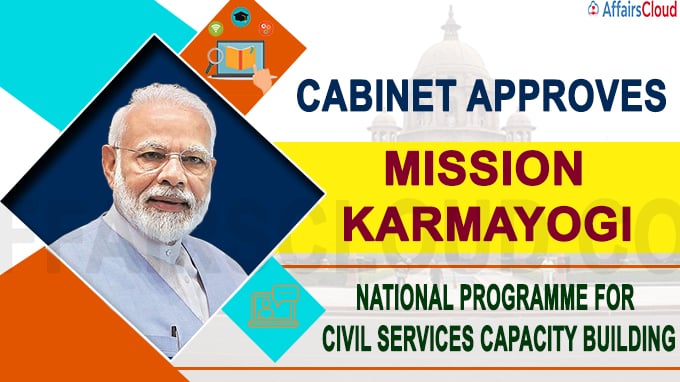 On September 2, 2020, the Union Cabinet chaired by Prime Minister Narendra Modi approved the following proposals:
On September 2, 2020, the Union Cabinet chaired by Prime Minister Narendra Modi approved the following proposals:
–Cabinet approved “Mission Karmayogi”- National Programme for Civil Services Capacity Building; Rs.510.86 cr outlay for 5 years
The Union Cabinet has approved the launching of a National Programme for Civil Services Capacity Building (NPCSCB) or “Mission Karmayogi” to enable government officers and employees get the opportunity to improve their performance under ‘iGOT-Karmayogi’ Digital Platform. In this regard a sum of Rs.510.86 crore will be spent over a period of 5 years from 2020-21 to 2024-25 to cover around 46 lakh Central employees.
- The expenditure is partly funded by multilateral assistance to the tune of USD 50 million.
- The objective of this mission is to prepare the Indian Civil Servant for the future with right attitude, skills & knowledge, aligned to the vision of New India by focusing on competency led capacity building.
- This information has been provided by Prakash Keshav Javadekar, Union Minister of Information and Broadcasting.
iGOTKarmayogiPlatform:
It is an Integrated Government Online Training (iGOT-Karmayogi Platform) that will be set up to provide anytime-anywhere world-class e-learning content to 2.5 crore civil servants. Besides capacity building, service matters like confirmation after probation period, deployment, work assignment and notification of vacancies etc. would also be integrated.
Institutional framework of “Mission Karmayogi”:
The programme’s institutional framework comprise of following 4 components:
Prime Minister’s Public Human Resources (HR) Council:
It will comprise of select Union Ministers, Chief Ministers (CMs), eminent public HR practitioners, thinkers, global thought leaders and Public Service functionaries under the Chairmanship of Prime Minister (Current-Narendra Modi).
- It will serve as the apex body for providing strategic direction to the task of Civil Services Reform and capacity building.
Capacity Building Commission:
The framework also proposed setting up a Capacity Building Commission to ensure a uniform approach in managing and regulating the capacity building on collaborative basis. The role of Commission will be as under:
- To assist the PM Public Human Resources Council in approving the Annual Capacity Building Plans.
- To exercise functional supervision over all Central Training Institutions dealing with civil services capacity building.
- To create shared learning resources, including internal and external faculty and resource centers.
- To coordinate and supervise the implementation of the Capacity Building Plans with the stakeholder Departments.
- To make recommendations on standardization of training and capacity building, pedagogy and methodology
- To set norms for common mid-career training programs across all civil services.
- To suggest policy interventions required in the areas of HR Management and Capacity Building to the Government.
SPV for owning & operating the digital assets and the technological platform for online training
A wholly owned Special Purpose Vehicle (SPV) for NPCSCB will be set up under Section 8 of the Companies Act, 2013. The SPV will be a “not-for-profit” company and will own and manage iGOT-Karmayogi platform by creating and operationalizing the content, market place and manage its key business services.
- The SPV will own all Intellectual Property Rights (IPRs) on behalf of the Government of India.
- An appropriate monitoring and evaluation framework will also be put in place for performance evaluation of all users of the iGOT-Karmayogi platform.
Coordination Unit headed by the Cabinet Secretary
Current Cabinet Secretary is Rajiv Gauba
Key features of NPCSCB:
-To support Transition from ‘Rules based’ to ‘Roles based’ HR Management means aligning work allocation to civil servants by matching their competencies.
-Emphasizing ‘on-site learning’ to complement the ‘off-site’ learning,
-To calibrate all Civil Service positions to a Framework of Roles, Activities and Competencies (FRACs) approach and to create and deliver learning content relevant to the identified FRACs in every Government entity,
-To partner with the best-in-class learning content creators including public training institutions, universities, start-tips and individual experts.
–Cabinet approves the Jammu and Kashmir Official Languages Bill
The Cabinet has also approved the introduction in Parliament of the Jammu and Kashmir Official Languages Bill 2020 under which Kashmiri, Dogri and Hindi also added to the existing Urdu and English, will be the official languages in the union territory (UT) of Jammu and Kashmir.Now J&K will have five official languages.
- The bill will be introduced in Parliament in the upcoming Monsoon Session and further details will be revealed after that.
- This information has been provided by Union Minister Prakash Keshav Javadekar, Ministry of Environment, Forest and Climate Change (MoEFCC).
Recent Related News:
On May 4, 2020, the 2020 Pulitzer Prize winners were announced in which three Indian photojournalists namely Dar Yasin, Mukhtar Khan and Channi Anand from Jammu and Kashmir who work for Associated Press (AP) have won the 2020 Pulitzer Prize in feature photography. The award recognized their exceptional coverage of Jammu and Kashmir during the lockdown that was imposed on Jammu and Kashmir by the Central Government after the revocation of Article 370 on August 5, 2019.
About Jammu & Kashmir (J&K):
Lieutenant Governor– Manoj Sinha
Capitals– Srinagar (Summer), Jammu (Winters)




